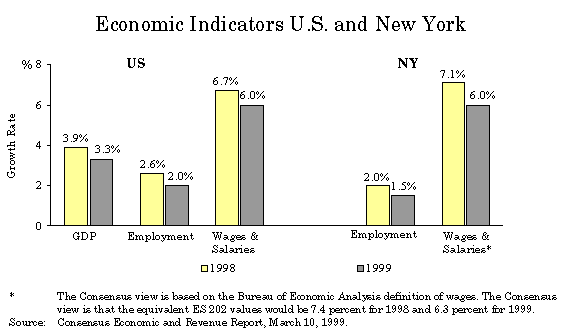Economic Overview
The National Economy
- Now entering its 96th month, the current expansion has gone on
record as the second longest in the postwar period.
- The Economic Consensus predicts that the national economy will slow down
only slightly in 1999 as compared with 1998. National economic growth, as
measured by growth in real Gross Domestic Product (GDP), will be 3.3 percent
during 1999 in contrast to 3.9 percent growth during 1998 (see Figure 1).
Figure 1
- Inflation, as measured by the Consumer Price Index, is expected to grow
2.1 percent, following an increase of 1.6 percent in 1998.
- National employment growth has been quite strong, but is expected to decline
from 2.6 percent growth in 1998 to 2.0 percent in 1999.
- The Consensus anticipates slower growth in U.S. wages and salaries of 6.0 percent
for 1999, following 6.7 growth for the previous year.
- Corporate Profits are expected to increase by 1.7 percent to 3.6 percent
in 1999 following a 1.4 percent decline in 1998.
- The three-month Treasury bill rate is expected to average 4.4 percent, four-tenths
of one percentage point lower than the 1998 annual average.
The New York State Economy
- New York continues to lag the nation in employment growth. Estimated State
employment growth of 2.0 percent for 1998 is still considerably below the
national rate of 2.6 percent.
- The Consensus view is that the State economy will generate employment growth
of 1.5 percent in 1999, which is below the 1998 rate of 2.0 percent.
- The largest component of personal income, wages, and salaries is expected
to grow 6.0 percent in 1999, following 7.1 percent growth last year (1)
(see Figure 1).
(1) The Consensus view is based
on the Bureau of Economic Analysis definition of wages. The Consensus view is
that the equivalent ES 202 values would be 7.4 percent for 1998 and 6.3 percent
for 1999.

